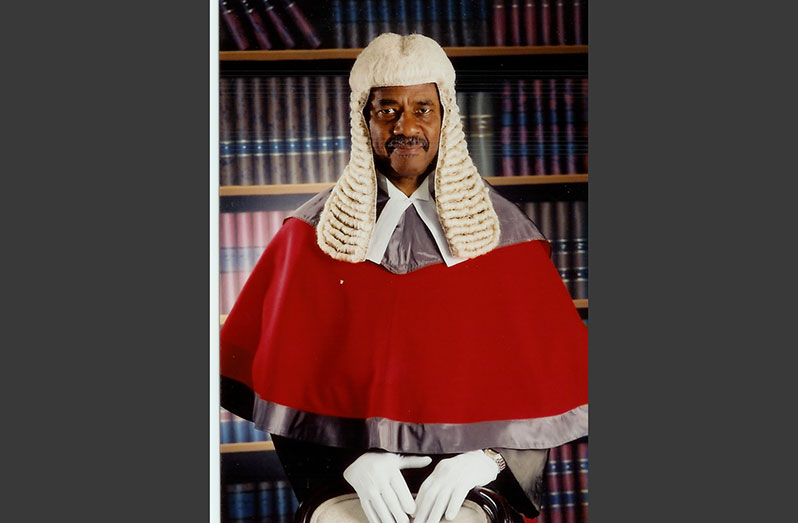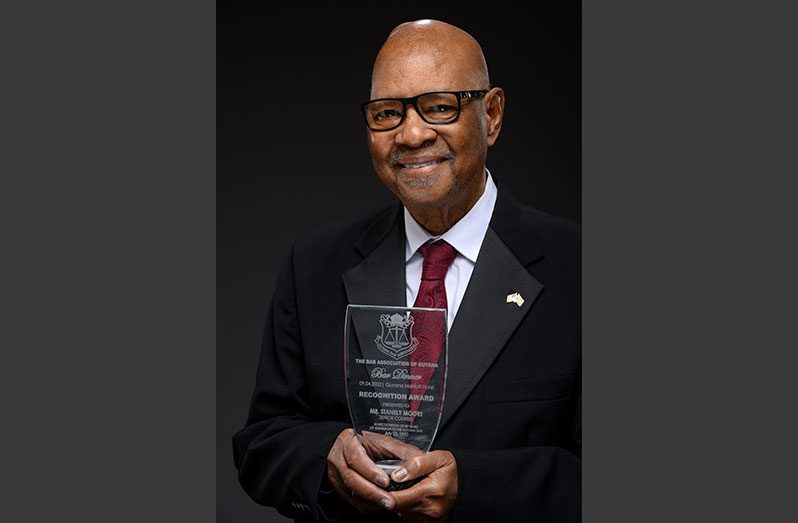ATTORNEY-AT-LAW and Senior Counsel, Stanley Alfred Moore, who sat as a Judge in several jurisdictions, was awarded and acknowledged for his illustrious 50-year career by the Guyana Bar Association.
The retired judge joined the Bar Association in July 25, 1970.
“Lawyers don’t stop working until our mind stops…I just can’t retire and go home. I think it’s the way we lawyers are built,” the 86-year-old attorney told the Sunday Chronicle in a recent interview at his Croal Street, Georgetown office.
His legal career goes beyond the Caribbean to the most distant lands of the African Continent where he calls Botswana and Eswatini home.
Eswatini, officially the Kingdom of Eswatini, was formerly renamed Swaziland.
Attorney Moore was born in New Amsterdam, Berbice. He is married to Cheryl Moore and they have five children, one of whom has since passed on.

In 1979, he acted as a judge in Guyana and in 1990, he was the Attorney-General in Montserrat; and then in 1992, he became a Supreme Court judge in Eastern Caribbean spending his first stint in Grenada until 1996, and the second stint in the British Virgin Islands until 2000. Thereafter, he joined the Commonwealth Bahamas Supreme Court.
In his retirement from the bench of the Bahamas Supreme Court, attorney Wayne Munroe, on behalf of the Bahamas Bar Association, stated that Mr. Moore was “blessed with a superior capacity for rationale and intelligent thought, possessed with a deep sense of fair play and a passion for the rule of law. Justice Moore demonstrated honesty and true scholarship in his application of the law.”
In numerous other presentations, Mr. Moore was described as a “caring judge, “legal eagle”, “charming and beguiling”, and “interesting conversationalist” amongst others.
Having achieved notable success in his career, Moore admits that he is not as sharp as he once was, but notes that his mind is ever-ticking. Despite his age, Moore still attends court. His goal is to stay active and remain au fait with the discipline of law for as long as possible.

However, he noted that he takes life in strides. His satisfaction comes from relishing in the memories of his prime years of private practice and working as a judge, locally and overseas.
Photographs from that time, some of which hang from the walls of his office, are among some of his most valued treasures. Despite his professional accomplishment, the lawyer said he is forever humbled by life’s lessons.
Moore gave his time and effort to educate upcoming lawyers at the University of Guyana and the University of the West Indies.
He was also a visiting professor at the Florida State University for Comparative Law, Alternative Dispute Resolution, and Public International Law in the early 2000s.
He also worked with the Commonwealth Judicial Education Institute and developed significant foreign connections. In the early 2000s, the Senior Counsel was engaged in several programmes at the institute.
While attending a forum in Canada on behalf of the institute, he met four South African Judges and this piqued his interest in the South African legal system.

He visited Botswana and Swaziland and between 2004 and 2014, he was appointed to serve as a Justice of Appeal in both countries.
He shared that his most memorable case was his acquittal of a South African woman who was charged with the murder of her lover after she found out he was having an affair.
“I keep wondering whatever happened to that woman…I set her free because when I reviewed the evidence, it was a clear case of self-defence.”
Separate from his illustrious legal occupation, Moore recounted that his other passions included theatre and acting for which he developed a love while in England.
Justice Moore said that he loved acting and was involved in several plays at the Theatre Guild.
Noting that he also was a broadcaster, he added, “I worked part-time at Radio Demerara and Guyana Broadcasting Service (GBS) providing analysis and ball-by-ball cricket commentary.”
Further, he described broadcasting legend, Rafiq Ahmad Khan as one of the greatest broadcasters in Guyana’s history.
Currently, the retired Judge is satisfied with spending leisure time with his wife Cheryl, seven grandchildren and four remaining children: Alfred Thompson Moore, Susan Moore Williams, Adrian Moore, and Senior Magistrate Alex Hubert Moore.
LIFE BEFORE THE LAW
Moore was born on July 1, 1935, to parents Olive Isabella Walcott-Moore and Llewellyn Cornett Moore. At the age of two, the family relocated to Thomas Street, Kitty, Georgetown.
In that period of British Guiana, the former judge gave his first recollection of life in the quiet neighbourhood of Kitty.
His father was employed at the Transport and Harbours Department as a Marine Engineer and his mother worked as a seamstress to help provide for the family.
The family held education in high regard, so the Moore brothers attended St. James the Less Anglican School. But in 1939, the family was separated by unavoidable circumstances.
His father was enlisted to join the troops fighting in World War II and never returned home.
The attorney said that this did not prevent his mother from ensuring that her two sons excelled in their academics.

“My mother worked hard, but it takes a village to raise a child, really, so relatives of both the Moore and Walcott sides of the family who lived in close proximity of us in Kitty were able to support.”
After completing school at the elementary level, Moore said that he opted to attend Tutorial High School since in then British Guiana high school education was not free.
“In those days, fees were attached to attending Queen’s College, and I naturally did not want to burden my mother with the cost of my education. So I took advantage of a scholarship to Tutorial High School,” he added.
He said that he was among the first group of students to successfully lobby for and complete a sixth-form education at the institution.
“I was one of four students to sit and pass the Cambridge Higher Certificate Examinations, there.”
After completing his high school education, Moore entered the world of work. He said that he was employed as a pupil teacher for one year and he taught at his old elementary school, St. James the Less, and St. Barnabas Primary.
Teaching, he said, gave him the foundation he needed to build his career. In furthering his development, he was among the selected few to be employed as an officer at Customs and Excise for Her Majesty, the Queen’s Customs in British Guiana.
The position was prestigious since in the Colonial days, non-Whites were not allowed to hold certain positions in the public service.
However, by that time the British Empire was starting to lose its ruling grip on Guyana (then British Guiana).
In those days, only certain types of people were permitted to apply for certain jobs.
“I can tell you of instances where newspapers would advertise vacancies, but cautioned persons that if they were not fair in complexion with straight hair, they needed not apply.”
By 1960, Moore had married his first wife, Solita McKenzie, and they had two children. They divorced 12 years later.
THE LIFE OF LAW
Meanwhile, it was while working at Customs and Excise that he developed an interest in the law.
“I knew I could not afford the funds to study formally, so I began the course by self-tuition.”
However, as fate would have it, the aspirant lawyer would cross paths with a Guyanese scholar named Frederick Wills who would later became his mentor.
“Mr. Wills was conducting classes for law students and I joined the class,” Moore said. He regarded the opportunity to be taught by Wills as most esteemed and humbling given the fact that he was among students who would later be described as some of Guyana’s veteran and distinguished legal minds.
Those who heaped praises on Moore included Senior Counsel Rex Mc Kay – whom Moore regards as another mentor; former Chancellor of the Judiciary and former Judge of the Caribbean Court of Justice, Desiree Bernard; former Chancellor of the Judiciary, Aubrey Fitz-Ronald Bishop; former Judge of the Caribbean Court of Justice, Duke Pollard and former Solicitor General of Guyana, Mohamed Ayube Ali Mc Doom.
During this time, Moore made yet another career shift, which allowed him to further his studies. He went to work as a manager at the Booker’s Enterprise, a London-based firm which controlled some 30 percent of the country’s economy.
However, on the advice of Fredrick Wills, he sat the London University examination and was successful in obtaining his LLB degree and later resigned from Booker’s Enterprise.
Moore now had his sights set on furthering his legal studies at a London-based institution.
“It was an amicable separation. It was on such good terms that they offered to take me on one of their ships to London,” Moore said noting that the journey took 11 days on the ship.
Once in England, Moore enrolled at the Lincoln Inn University to study for the English Bar examination. By 1970, Moore had already completed his final bar exams and acquired a Commonwealth scholarship to read for a Master Degree (LLM) at the University College of London.
Moore’s career led him later to serve as acting Magistrate and Judge for a short period.
In further reflecting on his life’s journey, he said there was a brief stint in politics.
He recalled that in 1981, he was appointed under Linden Forbes Burnham’s Administration to serve as Minister of Home Affairs, but resigned after serving for one year.
“It was rather brief but I think everyone, at that time, had agreed that the Cabinet was too large, so I offered to resign, and this was understood in a press statement by Mr. Burnham.”
Moore said he grew up a stone’s throw away from the former President who knew of his capacity and capabilities as a lawyer.
His other political positions included Attorney General of Montserrat and later acting Governor of Montserrat.
The lawyer notes that the latter, which he served for two years (1990-1992), is equivalent to the post of a Caribbean Prime Minister or an Executive President.
Given his association with politics, Moore was appointed as a Member of Parliament in both Guyana and Montserrat. He believes that he was quite fortunate to hold the positions.
He said he was merely looking for work, to be close to his second wife, Cheryl Pickering, who was working as a pilot in Antigua, when he applied for a government job and landed the appointment.
With his interest in justice never waning, the lawyer also took up senior judicial positions in The Bahamas, Grenada, and the British Virgin Islands.
He would later serve in Botswana and the Kingdom of Eswatini before returning to private practice.



.jpg)











